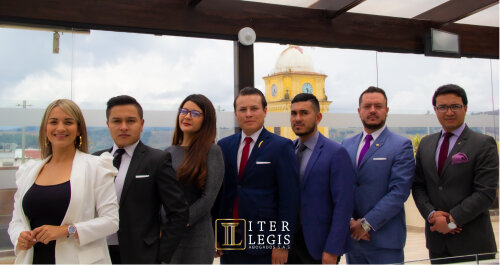Best Faith-Based Law Lawyers in Tunja
Share your needs with us, get contacted by law firms.
Free. Takes 2 min.
List of the best lawyers in Tunja, Colombia
About Faith-Based Law in Tunja, Colombia
Faith-Based Law in Tunja, Colombia refers to the legal considerations that arise from the intersection of religious beliefs, religious organizations, and the secular legal system. In Colombia, the Constitution recognizes freedom of religion, allowing individuals and religious communities to practice their faiths freely. Faith-Based Law typically addresses issues such as the legal status of religious entities, management of religious property, the rights of individuals and religious organizations, and questions arising from religious marriages or ceremonies. Tunja, as the capital of the Boyacá department, is home to a range of religious communities, making understanding these laws particularly valuable.
Why You May Need a Lawyer
Many situations can lead individuals and organizations to seek legal advice in the area of Faith-Based Law. These may include:
- Registering a new religious organization or association with governmental authorities
- Handling disputes over property or assets owned by religious entities
- Clarifying the rights and responsibilities of religious leaders and members
- Understanding the legal implications of religious marriages or ceremonies
- Resolving conflicts between religious beliefs and state laws, including employment and education issues
- Ensuring compliance with both national and local laws regarding religious practices and events
- Protecting freedom of religion and responding to discrimination or limitations imposed by public authorities
- Navigating immigration matters connected to missionary work or religious service
Local Laws Overview
In Tunja, and across Colombia, the legal framework for Faith-Based Law is grounded in the Colombian Constitution, which explicitly protects freedom of conscience and religion. Key points relevant in Tunja include:
- The government is secular, but religious entities have legal recognition if they register with the Ministry of Interior.
- Registered religious organizations can own property, operate schools or charities, and have the ability to enter into contracts.
- Religious marriage ceremonies can have civil validity if the officiant is recognized by the government.
- Disputes between members or leaders of religious organizations may be settled internally, but civil courts can become involved if legal rights are at stake.
- The Boyacá region recognizes the diverse religious landscape and generally supports religious activities, but all events must comply with local regulations regarding public order and safety.
It is important to note that while religious practice is protected, all organizations and individuals are still subject to national laws regarding discrimination, taxation, and public behavior.
Frequently Asked Questions
What is the legal process for registering a religious organization in Tunja?
To register a religious organization, you must submit documents to the Ministry of Interior, including bylaws, foundational acts, and a list of members or directors. The process ensures legal recognition and certain benefits for the organization.
Are religious ceremonies, such as weddings, legally binding in Tunja?
Religious weddings can be legally binding if the officiant is accredited and the marriage is registered with local civil authorities. You should confirm that all legal steps are followed to ensure civil recognition.
Can religious organizations own property in Tunja?
Yes. Once legally registered, religious organizations have the right to own, buy, or sell real estate and other assets in their own name.
What protections exist for freedom of religious practice in Tunja?
The Colombian Constitution and local laws protect individuals' rights to practice their religion freely, provided these practices do not interfere with public order, safety, or the rights of others.
How are disputes within religious organizations resolved?
Many disputes are handled internally according to the organization's rules. If legal rights or property are involved, Colombian civil courts may get involved.
Are faith-based schools legal in Tunja?
Yes. Faith-based schools are permitted as long as they comply with Ministry of Education guidelines and do not discriminate against students.
Can my religious organization be exempt from taxes?
Registered religious entities can apply for certain tax exemptions related to their religious activities, though commercial activities may be subject to taxes.
What should I do if I feel discriminated against because of my religion?
Colombian law prohibits discrimination based on religion. If you face discrimination, you can report it to the Defensoría del Pueblo or consult with a local lawyer for legal remedies.
Is missionary work by foreigners allowed in Tunja?
Foreigners can engage in missionary work, but they must comply with immigration laws and may require specific visas or permits to work or volunteer in religious capacities.
What government bodies oversee Faith-Based Law in Tunja?
The Ministry of Interior governs the legal recognition of religious entities. Local municipalities may also have rules about public gatherings or property use for religious purposes.
Additional Resources
If you need more information or assistance, consider reaching out to the following resources:
- Ministry of Interior - Office of Religious Affairs: Handles registration and legal status of religious entities
- Defensoría del Pueblo: Assists with protection of fundamental rights, including freedom of religion
- Secretaría de Gobierno de Boyacá: Oversees local regulations impacting religious organizations
- Catholic Diocese and Interfaith Councils: Many religious organizations provide guidance on internal matters and legal resources
- Local law firms specializing in constitutional or Faith-Based Law: Can provide tailored legal advice
Next Steps
If you believe you need legal assistance with a faith-based issue in Tunja, here are recommended steps:
- Identify the specific nature of your concern or dispute - Is it about property, internal governance, discrimination, or another matter?
- Gather all relevant documents, such as registration papers, correspondence, or contracts
- Contact appropriate resources, such as the Ministry of Interior or Defensoría del Pueblo, for administrative matters
- Consult with a local attorney experienced in Faith-Based or constitutional law for cases involving complex legal issues
- Follow legal advice and, when necessary, participate in mediation or court proceedings as guided by your lawyer
Early legal advice can help you protect your rights and navigate the unique challenges at the intersection of faith and law in Tunja, Colombia.
Lawzana helps you find the best lawyers and law firms in Tunja through a curated and pre-screened list of qualified legal professionals. Our platform offers rankings and detailed profiles of attorneys and law firms, allowing you to compare based on practice areas, including Faith-Based Law, experience, and client feedback.
Each profile includes a description of the firm's areas of practice, client reviews, team members and partners, year of establishment, spoken languages, office locations, contact information, social media presence, and any published articles or resources. Most firms on our platform speak English and are experienced in both local and international legal matters.
Get a quote from top-rated law firms in Tunja, Colombia — quickly, securely, and without unnecessary hassle.
Disclaimer:
The information provided on this page is for general informational purposes only and does not constitute legal advice. While we strive to ensure the accuracy and relevance of the content, legal information may change over time, and interpretations of the law can vary. You should always consult with a qualified legal professional for advice specific to your situation.
We disclaim all liability for actions taken or not taken based on the content of this page. If you believe any information is incorrect or outdated, please contact us, and we will review and update it where appropriate.









